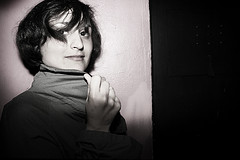Eulalio had always found it difficult to talk about the war. He used to say a bullet had grazed his arm the day of his birthday. When his great-granddaughter asked him how the war was, he used to look back and tell the story about the bullet. Not the truth. Only his granddaughter’s husband knew the truth. They were much alike: still, dark and cold, like a postwar night.
He always thought the war had been hard. This was not a war for money, this was a war for freedom, this was brother against brother. He joined the red army as a volunteer. He went to the front leaving a wife and two kids behind.
The republic of Spain was losing territory little by little, and his wife and children had to leave, had to flee from their home and go to Valencia, where the government of the Republic had moved; but after two years not even the coast was enough to be safe. They had to go to Madrid, to the front, to look for a man whose letters had been lost long ago, a man who might have been already dead. They found him in the front, in a little village. They could even live together in a modest house just 3 km from where the bombs were dropping. A lovely home indeed. The kids went to the “front schools”. They even had a Russian friend. He was one of the international brigadiers. The Russian used to called Eulalio “father”, just because his surname meant something like “priest”. And their army kept on fighting until everything was lost.
Then an edict came. Everyone should go right back to the places where they used to live before the war. And they went back into a home that was destroyed, back into the empty bellies and the kids crying, back to servitude.
And just as they got there, the police came to their home. They asked for him. He went to see what they wanted. They wanted him to go with them, and he went. They put him in a room of the town hall and beat him until he was unconscious. Then they beat him again. He never told anyone but his granddaughter’s husband about this. His eyes filled with tears as he told this story. And probably he cried while he was there. He was a socialist and he was naked and he had been beaten unconscious. And who knows what else. After that, he never went back to the place where he was born. This was Spain after the Civil War. This is anyone anywhere after any war.
After that, he was sent to jail in a big town. His wife, Josefa, too: she had sewn a republican flag. He had to be there for one year; she was there for six months. The kids were with someone, it used to be like that. No parents, catholic schools and hunger. Then his wife was released from prison. Right after that, she went to the men’s prison to see her husband. It was not visiting day. She said she had just come from a village, that she had just had a kid and she couldn’t go back any other day. She told her name, and the policeman went and checked it. He realized who she was, and that she had just been released about an hour before. He wasn’t harsh to her and allowed her to get in. In fact, she was quite lucky, people died for less than that.
After prison she got involved in the black market and got some money. She and the kids were living with some gypsies at the time, working for them. Then she got a job as a deliverer. Everything was going quite fine until the day they told her that her husband had been shot in the escape.
It was a dark and cold night. Nights are usually dark and cold after a war, no matter if it’s summer or winter, no matter if it’s cloudy or there’s a big white moon. It was cold and dark anyway. A slight breeze came over the city. It was late, not a soul, not a sound. Only slight splashes from the river, maybe the fish. Still night. And suddenly, shots. And cries. And more shots. Shots until everyone but one was dead. And then the river carried the red blood of the corpses that had already sunk.
Everyone was dead. The news spread, and Josefa heard them. Her hair went white and her period stopped when she was just 30. They say it can happen after a big shock. The next day she went to the prison. They told her that there had been an escape that night, that the prisoners had been talking about it for days, planning everything. They wouldn’t allow her in, but they told her that there were a couple of men left, and that one of them was her husband. He had stayed in his cell all night. Never trust anyone who’s not you, he used to say. Never mind waiting. And he waited, and he was not killed by the soldiers waiting on the opposite side of the river. It was a fake escape, prepared from above. He had said he wouldn’t risk his whole life just to not wait one month. He had always been a good predictor. He could even read the stars. And it seems that on that cold and dark night he read the word “death” written in the empty postwar sky.
28 de diciembre de 2005
Suscribirse a:
Enviar comentarios (Atom)



No hay comentarios:
Publicar un comentario